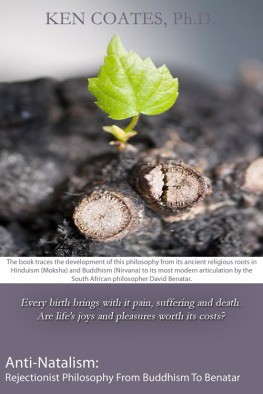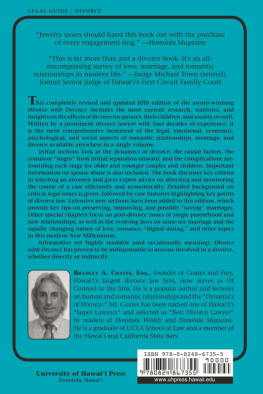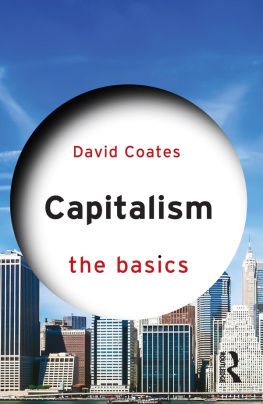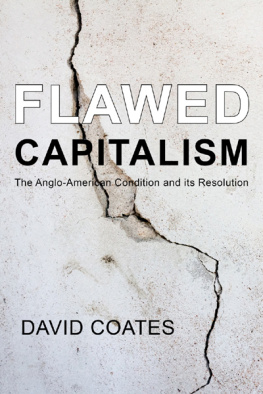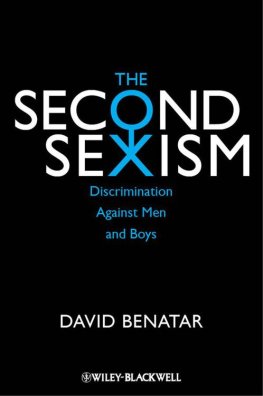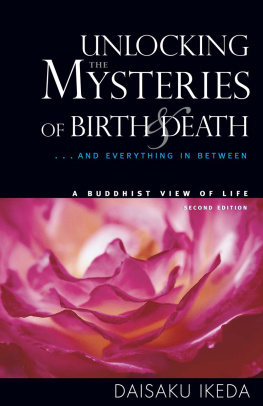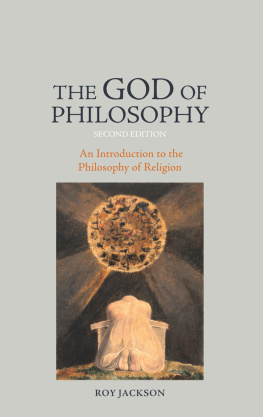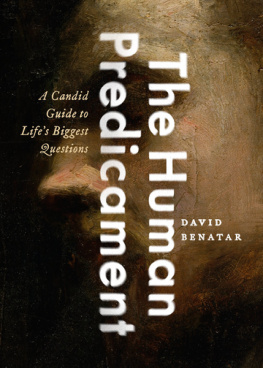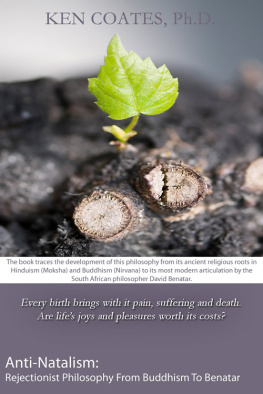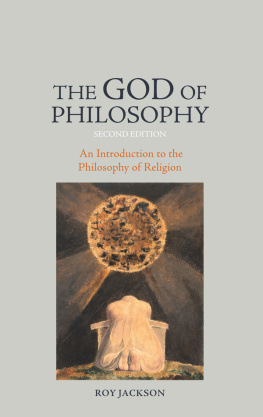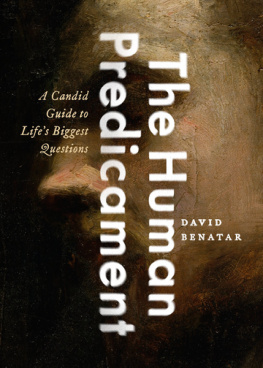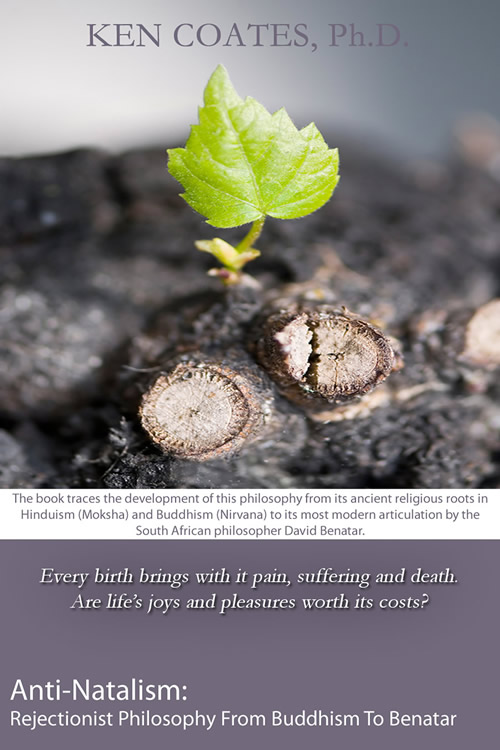First Edition Design Publishing, Inc.
P.O. Box 20217, Sarasota, FL 34276-3217
ALL RIGHTS RESERVED. No part of this book publication may be reproduced, stored in a retrieval system, or transmitted in any form or by any means electronic, mechanical, photo-copy, recording, or any other except brief quotation in reviews, without the prior permission of the author or publisher.
Professor David Benatar's example and encouragement have been important in writing this book. He also read and commented on parts of it. My grateful thanks to him. I, however, remain solely responsible for its contents.
Preface
The last few decades seem to have begun what has been called the childless revolution. In economically developed countries more and more people are choosing not to have children. The causes of this revolution are many. One of these is the belief that to create a new life is to subject someone unnecessarily, and without their consent, to lifes many sufferings including death. This belief and its underlying philosophy is known as anti-natalism. There has been a recent resurgence of this philosophy, with David Benatars book Better Never To Have Been (2006) as a major catalyst. Anti-natalism can be seen as part of a larger philosophy, described here as Rejectionism, which finds existence directly or indirectly, i.e. as procreation - deeply problematic and unacceptable.
The book traces the development of this philosophy from its ancient religious roots in Hinduism (Moksha) and Buddhism (Nirvana) to its most modern articulation by the South African philosopher, David Benatar (2006). It examines the contribution to rejectionist thought by Arthur Schopenhauer and Eduard von Hartmann in the 19th century and Peter Wessel Zapffe, a little known Norwegian thinker, in the 20th century and most recently by Benatar. In part the unfolding of this philosophy over the centuries is the story of a transition from a religious to a secular at first metaphysical, and later to a positivist approach in the form of anti-natalism. Zapffe and Benatar represent the anti-natal approach most clearly.
The book also devotes a chapter to the literary expression of rejectionist philosophy in the works of Samuel Beckett and Jean Paul Sartre. In sum, far from being an esoteric doctrine rejectionism has been a major presence in human history straddling all three major cultural forms religious, philosophical, and literary.
The book argues that in developed countries where procreation is a choice, natalism or having children (Acceptance) is as much a philosophical stance in need of justification as its opposite, i.e. anti-natalism (Rejection). Secondly, the recent advance of anti-natal practice and the possibility of its further progress owe a great deal to three major developments: secularization, the liberalization of social attitudes, and technological advances (contraception). Anti-natal attitudes and practice should therefore be seen as a part of progress in that these developments are widening our choice of lifestyles and attitudes to existence. Thirdly, and it follows, that anti-natalism needs to be taken seriously and considered as a legitimate worldview of a modern, secular civilization. Recent critique of anti-natalism has tended to treat it as a deviant or esoteric, if not a bizarre, viewpoint, restricted to a fringe or counter-culture. This is to misunderstand or misrepresent anti-natalism, and one of the objectives of this book is to situate current anti-natalist thought in its historical and philosophical perspective. Finally, it is argued that in order to further the development of anti-natalism it needs to be institutionalized as a form of rational philosophy of life and more attention needs to be paid to the problems and prospect of putting this philosophy into practice.
Introduction
Human beings are the only creatures conscious of their own existence. Other living beings do not know that they exist. They cannot help going on living - reproducing and continuing the species - as programmed by nature. Humans alone have the capacity to interrogate their own existence. Since the dawn of consciousness human beings have found themselves confronting an existence they did not choose and which puts them through a great deal of pain and suffering physical and mental - leading eventually to death.
To make life with all its multifarious evils acceptable and meaningful humans have invented religion, a supernatural system of beliefs, which, among other things, seeks to justify and legitimize existence. Yet even religions have not found it easy to endorse life with all its evils man-made and natural and have sought ways of emancipation from it1. For example Hinduism and Buddhism, with their concepts of Moksha and Nirvana respectively (Koller 1982, 67; Snelling 1998, 54-5) point a way of transcending the phenomenal world with its recurring cycle of births and deaths. In addition, secular philosophies which consider existence to be a bad rather than a good have their own views about the evil of existence and the way out.
Modern - mid-20th century onwards - secular philosophies see anti-natalism, i.e. refraining from procreation, as the way to liberation2. Besides expressing compassion for the unborn the decision not to reproduce is also a way of saying no to human existence. What these religious and secular philosophies have in common is the view that life in general and human life in particular is inherently flawed and that overcoming it would be a good thing. While other creatures cannot escape their bondage to nature human beings can. They have the capacity to free themselves from the yoke of nature and to end their entrapment. And so they should. Broadly, the religious approach is based on freeing oneself from the will-to-live and the bondage to worldly desires whereas modern secular philosophies see anti-natalism as the key to emancipation.
But surely the prescription of anti-natalism is counter-intuitive? Our instincts make us want to live and to reproduce. The sex drive is one of the strongest physical urges and, in the absence of contraception, results naturally in reproduction. True, as anti-natalists remind us, the coming of contraception has sundered the natural bond between coitus and conception. Celibacy is no longer necessary in order to prevent reproduction. The sex urge need not be denied to avoid conception. And as far as an instinct to reproduce is concerned this remains a somewhat dubious proposition at least as far as humans are concerned.
However, a more important objection against these philosophies is that they are unduly pessimistic and one-sided. They seem to turn a blind eye to all that is positive about life. For if there is much pain and suffering there is also pleasure, joy, love, beauty, creativity and the like. In short, life comes as a package deal, with good and evil inextricably mixed together. How can one separate them? Why dwell on the negativities of existence alone forgetting the other side? These are weighty arguments and they have to be taken seriously. They raise important philosophical issues which will be considered later (Chapters 2, 3, 5 and 6). At this stage we would like to spell out the rationale for looking at these anti-existential viewpoints.

